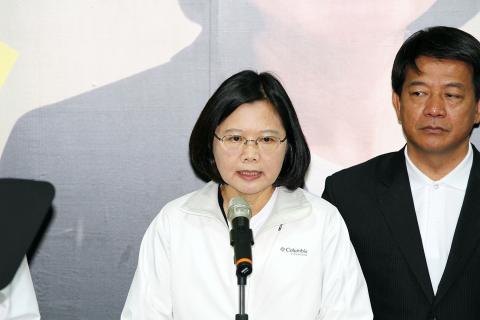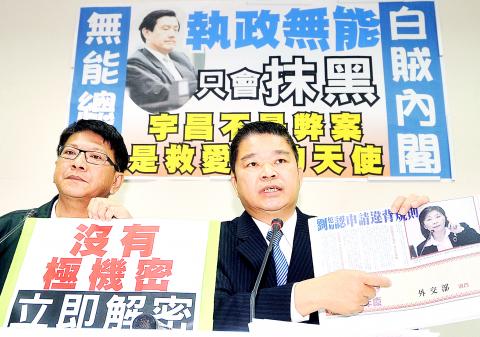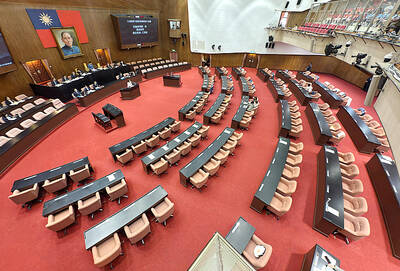Democratic Progressive Party (DPP) presidential candidate Tsai Ing-wen (蔡英文) yesterday accused President Ma Ying-jeou (馬英九) and the Chinese Nationalist Party (KMT) of resorting to “character assassination” to win next month’s presidential election by accusing her of profiteering from an investment deal when she served in the government.
At an impromptu press conference in Greater Tainan, Tsai said she and her family had never received improper benefits from Yu Chang Biologics Co (宇昌生技股份有限公司), a biotech start-up, and her integrity has always been unquestionable.
“I want to ask President Ma: Is it necessary for this kind of campaign? Is it necessary to do whatever it takes, including throwing mud at other candidates and resorting to character assassination to win the election and cover up the failures of your administration?” Tsai said.

Photo: Taipei Times
KMT lawmakers on Thursday accused Tsai of a conflict of interest because of her involvement with Yu Chang after she left office in August 2007, which received investment from the state-owned National Development Fund (NDF).
The KMT said Tsai, who later served as chairperson of Yu Chang, received NT$100 million (US$3.3 million) when she sold her shares in the company in 2009.
Tsai yesterday said the case had been thoroughly scrutinized in the past three years and no inappropriate practices have been found, adding that while she promoted the biotech industry when she was vice premier, she was never involved with Yu Chang.

Photo: Fang Pin-chao, Taipei Times
Tsai said she agreed to be chairperson of Yu Chang after being invited by several scientists, who persuaded her that her expertise in negotiation and fundraising would help the company.
Her family businesses invested in Yu Chang because of a lack of funding in the initial stage, Tsai said, adding that she had promised to withdraw the investment once sufficient private funding was in place, which she did.
“Neither myself nor my family received extortionate profits from the investment. Instead, the government received a profit of NT$1 billion,” she said.
The administrative branch, certain legislators and some media outlets have collaborated in a smear campaign that only disclosed selective information and made false accusations, she said.
Former Council for Economic Planning and Development chairperson Ho Mei-yueh (何美玥) offered her side of story in a separate press conference in Taipei.
Ho said the KMT had -misinterpreted some details. This included a document showing the NDF’s investment in Yu Chang that was classified as top secret, Ho said. This was done because it involved information surrounding the company’s negotiation with the US pharmaceutical company Genentech, which was seeking a foreign partner at the time, not because of secret maneuvers by Tsai, she said.
“The document can be declassified anytime after the collaboration agreement has been signed,” she added.
The NFD had invested in several companies that held national strategic significance, such as Taiwan Semiconductor Manufacturing, Vanguard International Semiconductor, Chunghwa Telecom and Changhua Bank, through “special investment projects,” DPP lawyer Hsu Kuo-yong (徐國勇) said.
This showed that the NDF’s investment in Yu Chang was not a special case, Hsu said, adding that the government increased its investment in Yu Chang last year by NT$137 million.
“If [Yu Chang] was a bad investment, the Ma administration would not have increased its investment,” Hsu said.
DPP spokesperson Chuang Ruei-hsiung (莊瑞雄) added that the DPP did not think Tsai had violated the “revolving-door” regulation when assuming the chair of Yu Chang after leaving office, according to the interpretation of the Executive Yuan’s Legal Affairs Committee.
If the KMT’s accusation is proved legitimate, Chuang said, there would be more than a few former government officials who were in violation of the regulation.
Additional reporting by Mo Yan-chih

CROSS-STRAIT COLLABORATION: The new KMT chairwoman expressed interest in meeting the Chinese president from the start, but she’ll have to pay to get in Beijing allegedly agreed to let Chinese Nationalist Party (KMT) Chairwoman Cheng Li-wun (鄭麗文) meet with Chinese President Xi Jinping (習近平) around the Lunar New Year holiday next year on three conditions, including that the KMT block Taiwan’s arms purchases, a source said yesterday. Cheng has expressed interest in meeting Xi since she won the KMT’s chairmanship election in October. A source, speaking on condition of anonymity, said a consensus on a meeting was allegedly reached after two KMT vice chairmen visited China’s Taiwan Affairs Office Director Song Tao (宋濤) in China last month. Beijing allegedly gave the KMT three conditions it had to

‘BALANCE OF POWER’: Hegseth said that the US did not want to ‘strangle’ China, but to ensure that none of Washington’s allies would be vulnerable to military aggression Washington has no intention of changing the “status quo” in the Taiwan Strait, US Secretary of Defense Pete Hegseth said on Saturday, adding that one of the US military’s main priorities is to deter China “through strength, not through confrontation.” Speaking at the annual Reagan National Defense Forum in Simi Valley, California, Hegseth outlined the US Department of Defense’s priorities under US President Donald Trump. “First, defending the US homeland and our hemisphere. Second, deterring China through strength, not confrontation. Third, increased burden sharing for us, allies and partners. And fourth, supercharging the US defense industrial base,” he said. US-China relations under

The Chien Feng IV (勁蜂, Mighty Hornet) loitering munition is on track to enter flight tests next month in connection with potential adoption by Taiwanese and US armed forces, a government source said yesterday. The kamikaze drone, which boasts a range of 1,000km, debuted at the Taipei Aerospace and Defense Technology Exhibition in September, the official said on condition of anonymity. The Chungshan Institute of Science and Technology and US-based Kratos Defense jointly developed the platform by leveraging the engine and airframe of the latter’s MQM-178 Firejet target drone, they said. The uncrewed aerial vehicle is designed to utilize an artificial intelligence computer

The Chinese Nationalist Party (KMT) caucus yesterday decided to shelve proposed legislation that would give elected officials full control over their stipends, saying it would wait for a consensus to be reached before acting. KMT Legislator Chen Yu-jen (陳玉珍) last week proposed amendments to the Organic Act of the Legislative Yuan (立法院組織法) and the Regulations on Allowances for Elected Representatives and Subsidies for Village Chiefs (地方民意代表費用支給及村里長事務補助費補助條例), which would give legislators and councilors the freedom to use their allowances without providing invoices for reimbursement. The proposal immediately drew criticism, amid reports that several legislators face possible charges of embezzling fees intended to pay